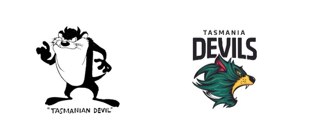Tasmanian Devils featured prominently in news headlines last week.
However, those were not the growling, screeching carnivorous marsupials that live in the forests of Tasmania, but rather a Hollywood cartoon character and several former and would-be AFL players who were at an impasse over the use of that name/mark.
The reason for the consternation was that U.S. media giant Warner Bros. decided they had a (meaty) bone to pick with the AFL marketing department over the naming of the newly formed Tasmania Devils club. Tasmania has long fought for the right to field a state team in the national competition. However, that has been gaining momentum for some time and the AFL sought to register trade marks including “Tasmania Devils” and “Tassie Devils” with IP Australia since 2019.
The Tasmanian Devil cartoon character, aka “Taz”, who has a well-known ‘whirlwind spinning’ manoeuvre, was created by the animation studio in 1954. Warner Bros. Entertainment Inc., (whose subsidiaries include Cartoon Network), had sought to secure their IP rights by registering trade marks, including the name “Tasmanian Devil” as a part of their character/logo marks, in 1982.
So far so good, as there was unlikely to be any real conflict or confusion in the market over the use of a similar name or mark in relation to the core business of each party, being the distribution of animated feature films and cartoons by Warner Bros and sporting events/fixtures by the AFL. There is also no real resemblance between the characters and the way they are illustrated (shown below) which would lead to any likely confusion. However, both organisations want to use the name Tasmania/n Devils (or similar) and to maximise their respective merchandising opportunities in the commercialisation of their respective product offerings, which created the overlap.

Warner Bros. currently has seven separate registered trade marks relating to the Taz character/logo in Australia, with the marks being applied to a wide range of goods including toys, games, clothing, television and comic books. Character merchandising and licensing is a highly lucrative business worldwide, so it comes as no surprise that Warner Bros. is eager to protect those rights.
The AFL has also sought to register a number of marks and their claims are similarly broad and varied, including for various sporting goods, apparel, clothing, games, household goods, kitchen items, jewellery, CDs and software amongst others.
It was reported that Warner Bros. executives were unaware that the Tasmanian Devil is a real animal. That is unlikely as their original (1982) trade mark acknowledges that Taz is designed – to resemble the marcupial of the genus dasyurus known as “Tasmanian Devil”.
Fortunately for the AFL, Warner Bros. was prepared to come to an amicable agreement to allow the use of the name “Tasmania Devils” (and presumably “Tassie Devils”), rather than the more widely used “Tasmanian Devils”. It has been reported that the parties have agreed to co-exist, which (if accepted by the parties) is endorsed by the Trade Marks office as a way of having competing trade marks registered at the same time.
There are a few takeaways for brand and trade mark owners, including:
- Identifying and registering your trade marks as soon as possible and before going to market– as it is far easier to enforce your rights and/or negotiate if you have the correct marks registered.
- For new brands, getting advice up front, undertaking proper due diligence and searches, and avoiding or resolving any issues is fundamental to success.
- Undertaking due diligence will also allow you to understand risks, identify any competing marks, negotiate an outcome, or pivot if necessary.
- Reviewing and updating your trade marks and the goods/services which they claim on a regular basis to make sure your protection is current and covers your core offering. Even though Warner Bros had used their mark for 30 years before registering, that has given them a strong position.
- Be vigilant and look out for others who might be entering into the market using similar marks and trading within the scope of your trade marks and with a similar product offering.
